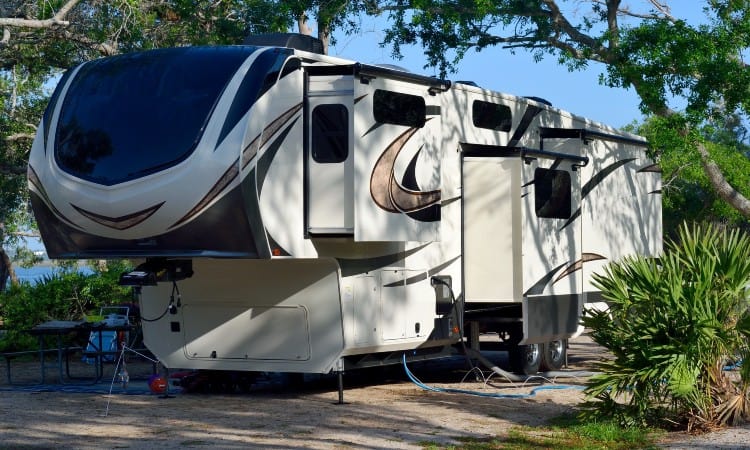Camping in RVs has been a thing for a while now. Because these campers provide a more comfortable experience than camping in a tent, they’ve become a favorite of many people.
Yet, in order to get the perfect camper for your next outdoor adventure, there are a lot of factors you need to consider first. Most importantly, you should have enough knowledge about its weight to tow it safely using the right vehicle.
But how much do campers weigh?
By the way, as an Amazon Associate, I earn when buying qualified products through links on my site.

On average, a camping trailer can weigh about 5,200 pounds with an empty tank and no additional gear. On a full tank and all the necessary gear included, you can expect that weight to gain an extra 1,500 pounds.
However, you should know that the weight of a camper depends on its length and structure type. Thus, we’ve decided to include a list of 21 real-life examples so that you can see for yourself.
21 Examples of How Much Campers Can Weigh
| Model | Length | Weight (Without Water or Gear) |
|---|---|---|
| 2019 10RK Hummingbird Trailer | 13 ft | 1,545 lbs |
| 2018 Sport 16RB Trailer (With Batteries and LPs) | 16 ft | 2,860 lbs |
| 2017 R-Pod RP-176 | 17 ft | 3,786 lbs |
| 2019 17RK Hummingbird Trailer | 19 ft 10 in | 2,980 lbs |
| Keystone 175 LHS Single Axle Trailer | 21 ft 5 in | 3,321 lbs |
| 2018 Sport 22FB Trailer (With Batteries and LPs) | 22 ft | 3,634 lbs |
| 2017 Coleman CTS192RDWE | 23 ft | 3,974 lbs |
| 2018 International Serenity 23CB Trailer (With Batteries and LPs) | 23 ft | 4,761 lbs |
| 2017 Salem Hemisphere 24BH | 24 ft | 5,118 lbs |
| 2017 Rockwood Mini-Light 2504s | 25 ft | 4,800 lbs |
| 2015 Jayco Jay Flight 26RKS | 26 ft | 5,605 lbs |
| 2015 Jayco Jay Flight 27RLS | 27 ft | 6,030 lbs |
| 2018 Airstream Land Yacht Trailer (With Batteries and LPs) | 28 ft | 6,586 lbs |
| 2019 24MBH White Hawk Trailer | 29 ft 2 in | 5,625 lbs |
| 2019 Grand Design Transcend 27BHS | 32 ft | 6,770 lbs |
| 2017 Cherokee West 274DBH | 32 ft | 7,705 lbs |
| 2019 30RD White Hawk Trailer | 35 ft 3 in | 6,620 lbs |
| 2018 Keystone RV Cougar X-Lite 33MLS | 36 ft | 8,040 lbs |
| 2019 32BHS White Hawk Trailer | 37 ft 10 in | 7,757 lbs |
| 2016 Jayco Jay Flight 38BHDS | 38 ft | 7,690 lbs |
| 2019 Forest River RV Wildwood DLX 353FLFB | 39 ft | 8,814 lbs |
Factors That Contribute Into the Weight of a Camping Trailer
As you can see from the previous table, campers can greatly differ in weight. However, before you make up your mind about buying one, you should consider everything that affects the weight of a camping trailer.
Water, Gear, and Passengers
Earlier, we’ve mentioned that water and gear will add up to 1,500 lbs to a camper’s weight. But let’s break down that number for you.
See, an average camper contains a 48-gallon freshwater tank, and water weighs 8 lbs per gallon. After doing the math, you’ll realize that the water alone can increase the weight of your camper by about 400 lbs.
Next comes the gear. You’ll need a generator to power up an air conditioner or any other electrical appliances if available. This generator will likely weigh around 100 lbs.
Not to mention the weight of any devices, kitchen supplies, food, and camping gear. Your personal items can make quite a difference in the overall weight of your trailer. Henceforth, you may want to add 500-600 lbs to the equation.
Last but not least, don’t forget about the weight of the people staying in the camper. This can be from 120 to 700 lbs depending on who you intend to take on a camping trip.
Slide-Outs
Naturally, if the trailer includes slide-outs, they could increase its weight to a great degree. Motorized slide-outs tend to weigh about 800 lbs.
Yet, a camper with a pop-up design won’t have the same effect on the weight. This is because these pop-ups are partially made of canvas. Thus, you’ll notice that a pop-up camper is considerably lighter than any other type of RV.
Construction Material
We can safely say that the type of construction used in making a camper is the most important factor here. Basically, camping trailers come in two designs.
The first one is known for its smooth exterior walls. This type uses a fiberglass construction with lightweight aluminum structuring. Therefore, it can be much lighter than the second option.
The other type of camper uses a wooden frame with aluminum corrugated sidings along its outer walls. Since it’s stick-built, this heavy wood structure adds about 900 lbs to the overall weight.
Types of Campers and Their Average Weight
We understand why you may want to know the weight of a camping trailer. This information will help you determine how to tow your future trailer.
To make matters easier for you, we’ll list the average weight of all the popular RVs that you’ll find on the market. Not just that, but we’ll also recommend the right type of vehicle to tow each camper.
Small Camper (Teardrop)
- Average weight: 600 to 3,000 lbs
- Recommended towing vehicle: car, SUV, minivan, cargo van, or truck
Pop-Up Camper
- Average weight: 1,400 to 3,200 lbs
- Recommended towing vehicle: SUV, minivan, cargo van, or truck
Travel Trailer
- Average weight: 2,300 to 8,800 lbs
- Recommended towing vehicle: SUV, minivan, cargo van, or truck
Airstream
- Average weight: 2,500 to 8,000 lbs
- Recommended towing vehicle: SUV, minivan, cargo van, or truck
Toy Hauler
- Average weight: 4,100 to 14,000 lbs
- Recommended towing vehicle: SUV, cargo van, or truck
Fifth Wheel
- Average weight: 5,900 to 11,500 lbs
- Recommended towing vehicle: truck

What Does Each Listed Number Mean?
Now that you have a better idea of what is in store for you, you can begin to browse the market for the right camper. Yet, looking up the specs of a camping trailer might be confusing, especially with different numbers indicating its weight.
Let’s clear that up for you in this section.
Unloaded Vehicle Weight
If a salesperson starts talking about the unloaded vehicle weight, then what they mean is the weight of the trailer alone. It doesn’t include the weight of a full tank or any additional gear.
Gross Vehicle Weight
This value equals the weight of the trailer including a full tank and an average load of gear or supplies. You could say that the gross vehicle weight is the maximum weight you’ll probably get out of this trailer.
Dry Hitch Weight
This is the weight that will press against the trailer ball of your towing vehicle when the camper is empty of water and gear. This value is low in comparison to the weight of the trailer, usually about 10% of the total vehicle weight.
Cargo Carrying Capacity
This indicates the maximum weight of gear, supplies, and people that the trailer should be able to withstand.
Understanding Your Towing Capacity
When it comes to towing your camper, things might not be as simple as they seem. As we mentioned before, different campers with varying weights require specific towing vehicles.
Although each vehicle has a maximum towing capacity, the weight of the camper you’ll be towing shouldn’t match this value. In fact, this weight should be much lower than the vehicle’s maximum capacity, not just by a few pounds.
If you tow a trailer that matches your vehicle’s towing capacity, you might face some issues in the future. These include damages to your vehicle’s engine or transmission.
Also, you don’t want your car pulling a heavier load up an incline.
Making Your Calculations
Now, how can you ensure that your vehicle will be able to tow your camper with no problems? Calculating this should be easy.
First, take the dry weight of your camper and add an estimated 1,500 lbs to the value. Of course, this additional weight accounts for passengers, water, and gear.
Next, write the resulting number on a paper and, using simple math, make sure that this number doesn’t exceed 85% of your vehicle’s towing capacity. Piece of cake, right?
But how do you figure out your vehicle’s maximum towing capacity?
Taking Note of Your Vehicle’s Maximum Towing Capacity
Your answer lies on the sticker inside your vehicle’s door. There, you should find the exact value of your car’s towing rating.
Not just that, but you’ll also find if there’s any special towing package included or any dealer’s accessories. Knowing all the towing details about the model of your vehicle is just within reach.
Measuring the Weight of Your Camper
Let’s say that you couldn’t figure out the exact weight of your camping trailer. Maybe you’ve lost your user’s manual or can’t seem to find it online. There’s still a way to know your camper’s dry weight to prepare it for towing.
All you’ll have to do is locate your nearest CAT scale or any roadside scale for an accurate measurement. Once you get there, drive your camper onto the platform, and you should get a reading of the total weight of your camper.
Also, you may want to load the trailer with everything you intend to travel with before measuring its weight. This will keep you from having to add the weights of all your gear, water, and supplies separately.
FAQs
How big of a camper can I tow with a truck?
You’ll find that most ¾ ton pickup trucks will be able to tow from 12,000 to 15,000 lbs of weight with no problem.
Yet, you should know that diesel models have a higher towing capacity. Because diesel is more suited for towing, these models tow from 14,500 to 18,000 lbs of total weight.
Is towing bad for your truck?
Only if you’re towing a camper that’s heavier than your truck’s maximum capacity. If you do this, your truck might face multiple issues such as:
- Engine damage due to overheating
- Additional stress to the truck’s frame
- Damage to the suspension and braking systems
- Transmission problems
To stay on the safe side, make sure that the total weight of your camper is lower than 85% of the truck’s maximum capacity.
Conclusion
There’s no wonder why RVs are popular. They introduce more convenience to your camping experience and make road trips all the more fun. But how much do campers weigh?
Hopefully, after reading our guide, you’ll come to realize that a camper’s weight depends on much more than its size. Liquids, gear, supplies, and passengers all contribute to the total weight of your camper.
Knowing all about a camper’s weight will help you determine the best method to tow it. After putting all these details into consideration, you should be able to get on the road with nothing to hold you back.
